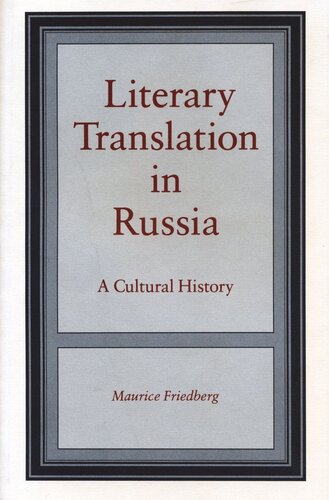

Most ebook files are in PDF format, so you can easily read them using various software such as Foxit Reader or directly on the Google Chrome browser.
Some ebook files are released by publishers in other formats such as .awz, .mobi, .epub, .fb2, etc. You may need to install specific software to read these formats on mobile/PC, such as Calibre.
Please read the tutorial at this link: https://ebookbell.com/faq
We offer FREE conversion to the popular formats you request; however, this may take some time. Therefore, right after payment, please email us, and we will try to provide the service as quickly as possible.
For some exceptional file formats or broken links (if any), please refrain from opening any disputes. Instead, email us first, and we will try to assist within a maximum of 6 hours.
EbookBell Team

4.4
62 reviewsIn this rich historical study, Maurice Friedberg recounts the impact of translation on the Russian literary process. In tracing the explosion of literary translation in nineteenth-century Russia, Friedberg determines that it introduced new issues of cultural, aesthetic, and political values.
Beginning with Pushkin in the early nineteenth century, Friedberg traces the history of translation throughout the lives of Dostoevsky, Tolstoy, and, more recently, Pasternak. His analysis includes two translators who became Russia's leading literary figures: Zhukovsky, whose renditions of German poetry became famous, and Vvedensky, who introduced Charles Dickens to Russia. In the twentieth century, Friedberg points to Pasternak's Faust to show how apolitical authors welcomed free translation, which offered them an alternative to the original writing from which they had been banned by Soviet authorities.
By introducing Western literary works, Russian translators provided new models for Russian literature. Friedberg discusses the usual battles fought between partisans of literalism and of free translation, the influence of Stalinist Soviet government on literary translation, and the political implications of aesthetic clashes. He also considers the impetus of translated Western fiction, poetry, and drama as remaining links to Western civilization during the decades of Russia's isolation from the West. Friedberg argues that literary translation had a profound effect on Russia by helping to erode the Soviet Union's isolation, which ultimately came to an end with the dissolution of the Soviet Union in 1991.